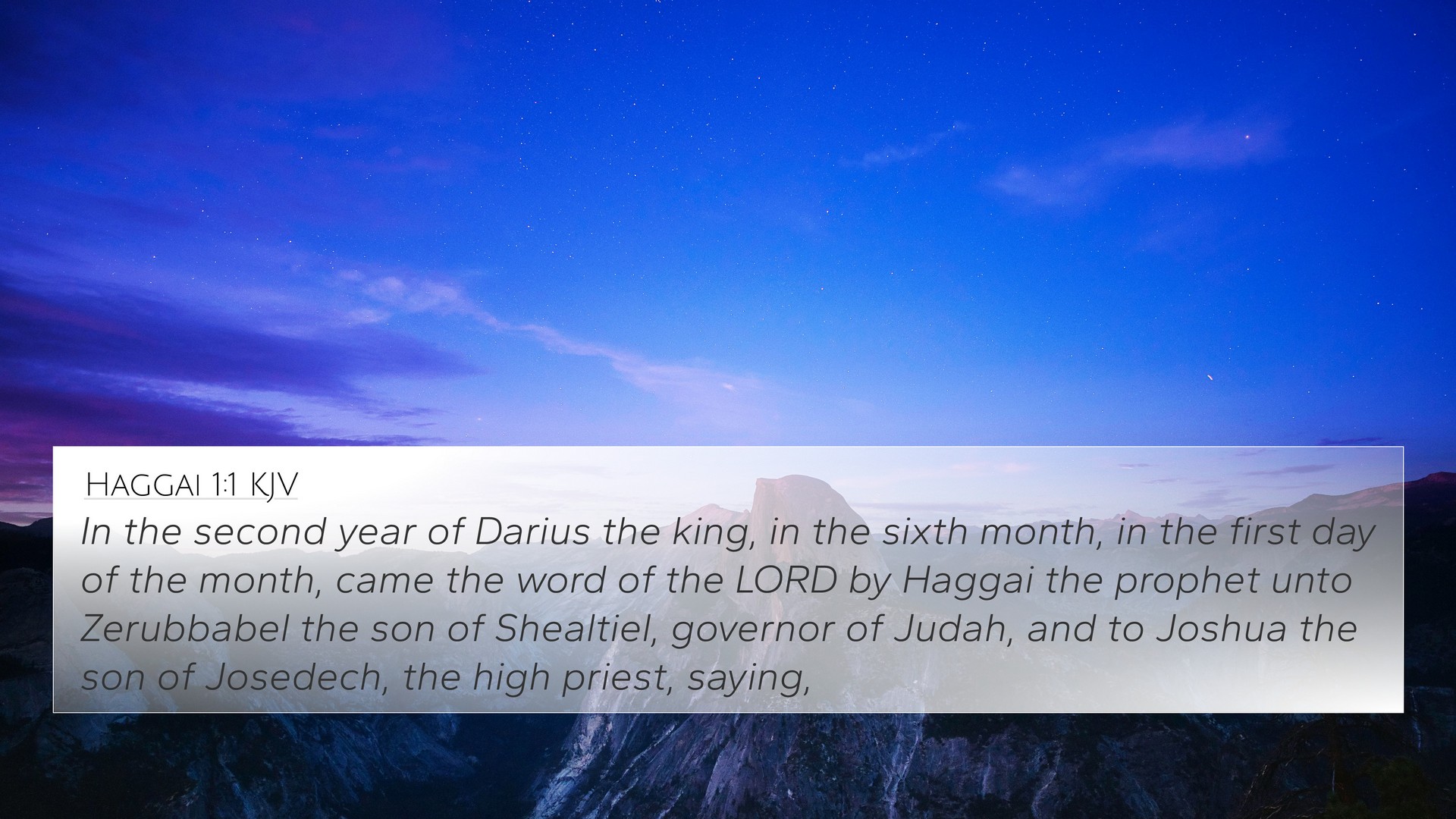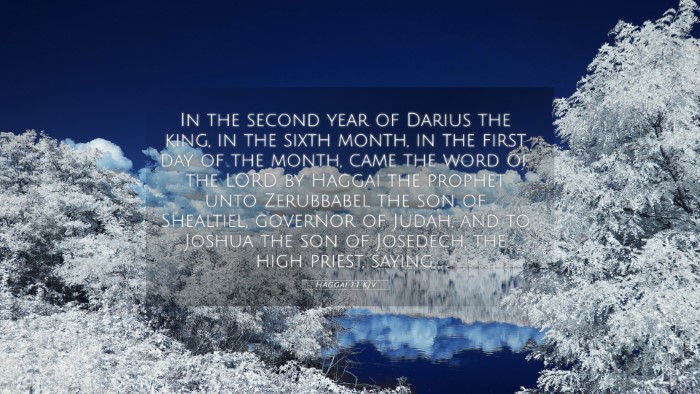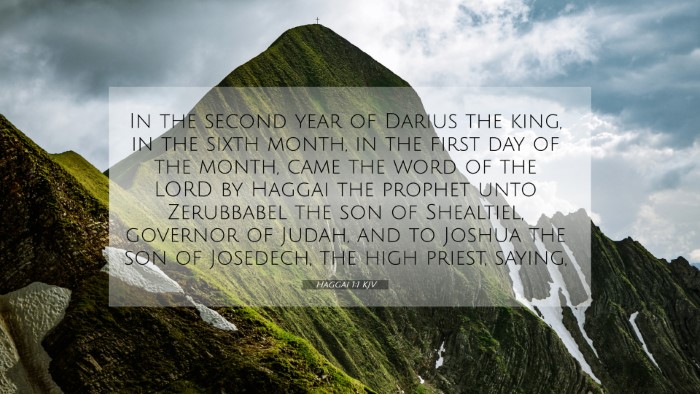Old Testament
Genesis Exodus Leviticus Numbers Deuteronomy Joshua Judges Ruth 1 Samuel 2 Samuel 1 Kings 2 Kings 1 Chronicles 2 Chronicles Ezra Nehemiah Esther Job Psalms Proverbs Ecclesiastes Song of Solomon Isaiah Jeremiah Lamentations Ezekiel Daniel Hosea Joel Amos Obadiah Jonah Micah Nahum Habakkuk Zephaniah Haggai Zechariah MalachiHaggai 1:1 Similar Verses
Haggai 1:1 Cross References
In the second year of Darius the king, in the sixth month, in the first day of the month, came the word of the LORD by Haggai the prophet unto Zerubbabel the son of Shealtiel, governor of Judah, and to Joshua the son of Josedech, the high priest, saying,
Uncover the Rich Themes and Topics of This Bible Verse
Listed below are the Bible themes associated with Haggai 1:1. We invite you to explore each theme to gain deeper insights into the Scriptures.
Haggai 1:1 Cross Reference Verses
This section features a detailed cross-reference designed to enrich your understanding of the Scriptures. Below, you will find carefully selected verses that echo the themes and teachings related to Haggai 1:1 KJV. Click on any image to explore detailed analyses of related Bible verses and uncover deeper theological insights.

Ezra 2:2 (KJV) »
Which came with Zerubbabel: Jeshua, Nehemiah, Seraiah, Reelaiah, Mordecai, Bilshan, Mizpar, Bigvai, Rehum, Baanah. The number of the men of the people of Israel:

Matthew 1:12 (KJV) »
And after they were brought to Babylon, Jechonias begat Salathiel; and Salathiel begat Zorobabel;
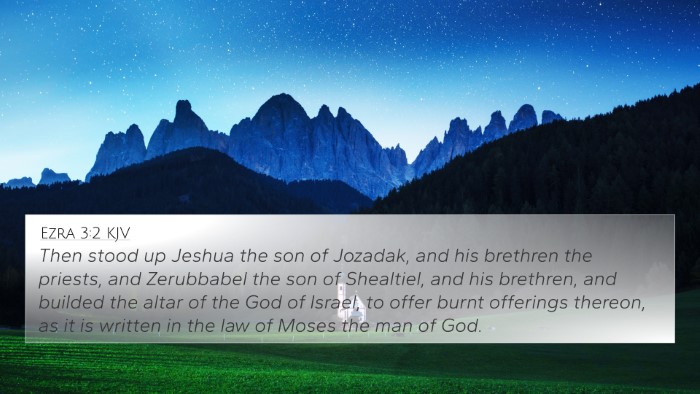
Ezra 3:2 (KJV) »
Then stood up Jeshua the son of Jozadak, and his brethren the priests, and Zerubbabel the son of Shealtiel, and his brethren, and builded the altar of the God of Israel, to offer burnt offerings thereon, as it is written in the law of Moses the man of God.
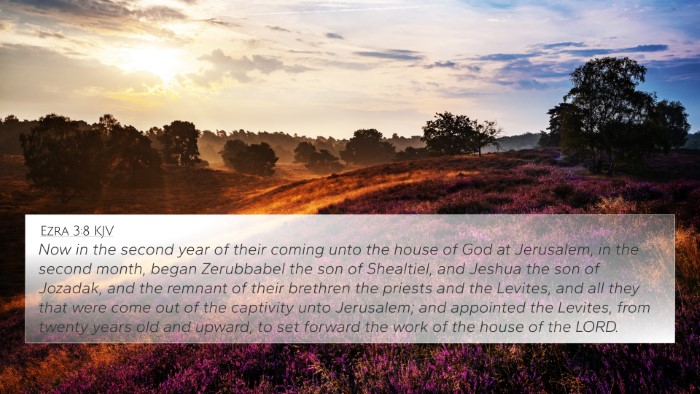
Ezra 3:8 (KJV) »
Now in the second year of their coming unto the house of God at Jerusalem, in the second month, began Zerubbabel the son of Shealtiel, and Jeshua the son of Jozadak, and the remnant of their brethren the priests and the Levites, and all they that were come out of the captivity unto Jerusalem; and appointed the Levites, from twenty years old and upward, to set forward the work of the house of the LORD.
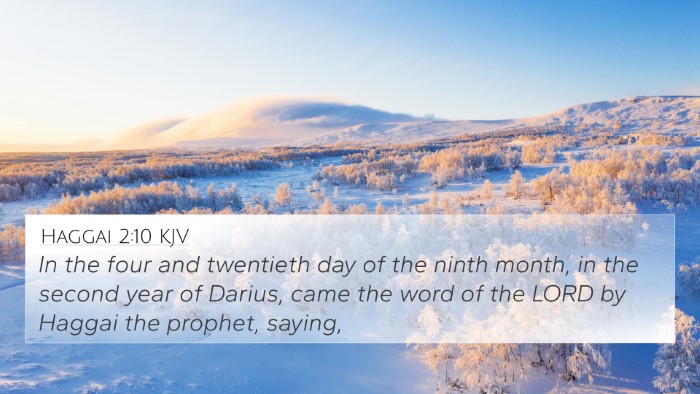
Haggai 2:10 (KJV) »
In the four and twentieth day of the ninth month, in the second year of Darius, came the word of the LORD by Haggai the prophet, saying,
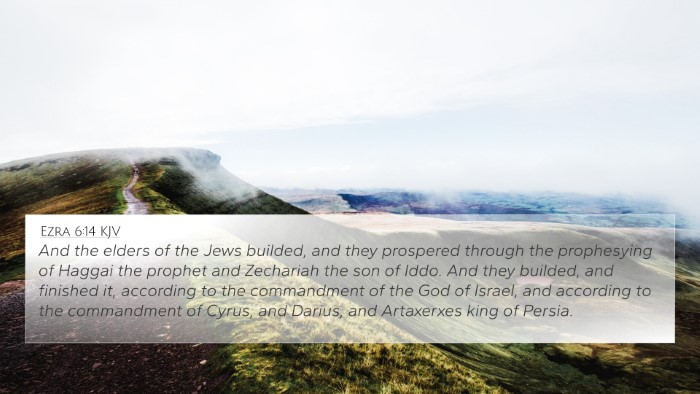
Ezra 6:14 (KJV) »
And the elders of the Jews builded, and they prospered through the prophesying of Haggai the prophet and Zechariah the son of Iddo. And they builded, and finished it, according to the commandment of the God of Israel, and according to the commandment of Cyrus, and Darius, and Artaxerxes king of Persia.
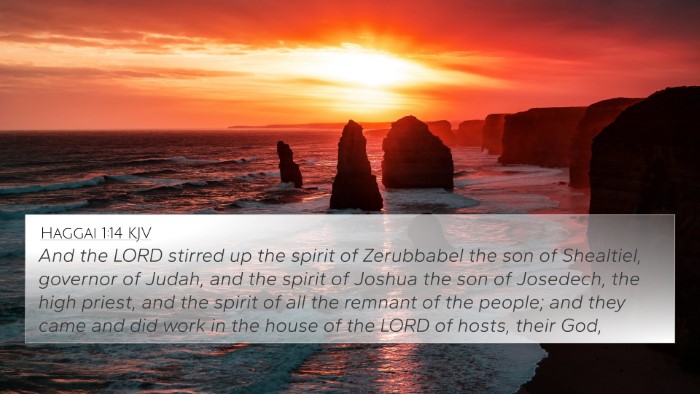
Haggai 1:14 (KJV) »
And the LORD stirred up the spirit of Zerubbabel the son of Shealtiel, governor of Judah, and the spirit of Joshua the son of Josedech, the high priest, and the spirit of all the remnant of the people; and they came and did work in the house of the LORD of hosts, their God,
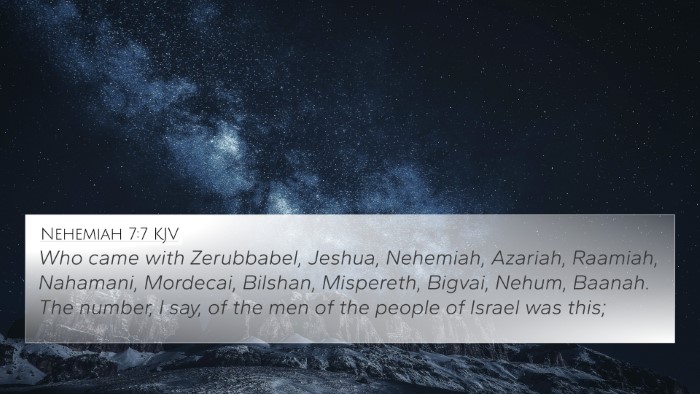
Nehemiah 7:7 (KJV) »
Who came with Zerubbabel, Jeshua, Nehemiah, Azariah, Raamiah, Nahamani, Mordecai, Bilshan, Mispereth, Bigvai, Nehum, Baanah. The number, I say, of the men of the people of Israel was this;
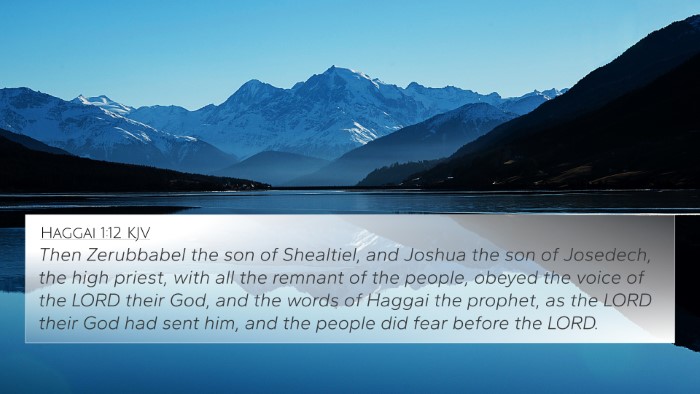
Haggai 1:12 (KJV) »
Then Zerubbabel the son of Shealtiel, and Joshua the son of Josedech, the high priest, with all the remnant of the people, obeyed the voice of the LORD their God, and the words of Haggai the prophet, as the LORD their God had sent him, and the people did fear before the LORD.

1 Chronicles 3:19 (KJV) »
And the sons of Pedaiah were, Zerubbabel, and Shimei: and the sons of Zerubbabel; Meshullam, and Hananiah, and Shelomith their sister:
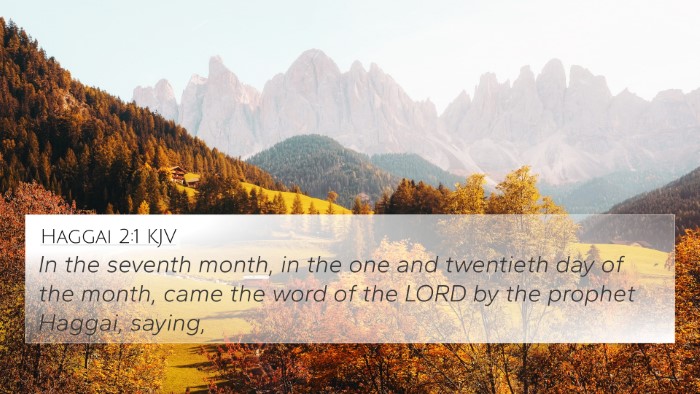
Haggai 2:1 (KJV) »
In the seventh month, in the one and twentieth day of the month, came the word of the LORD by the prophet Haggai, saying,

Haggai 2:4 (KJV) »
Yet now be strong, O Zerubbabel, saith the LORD; and be strong, O Joshua, son of Josedech, the high priest; and be strong, all ye people of the land, saith the LORD, and work: for I am with you, saith the LORD of hosts:
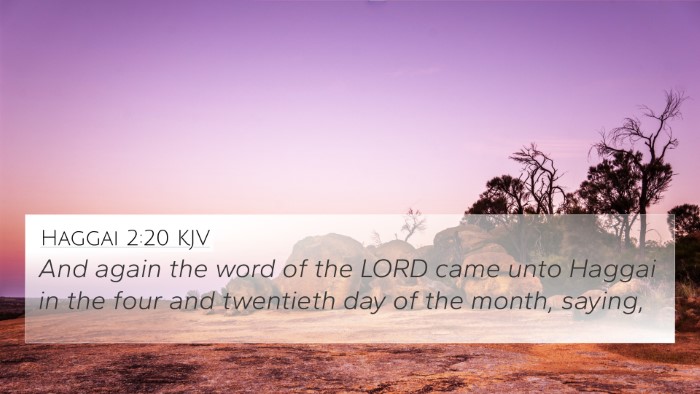
Haggai 2:20 (KJV) »
And again the word of the LORD came unto Haggai in the four and twentieth day of the month, saying,
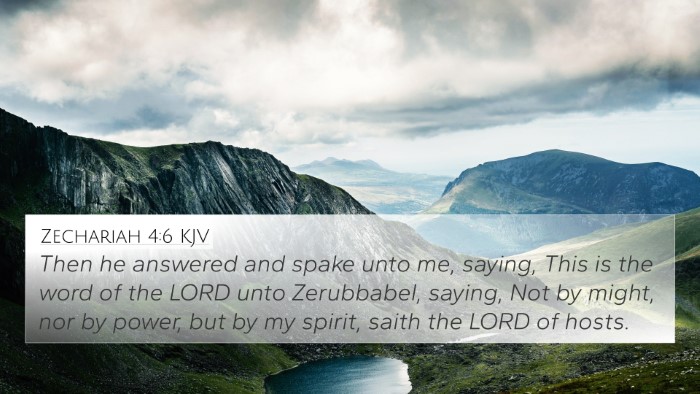
Zechariah 4:6 (KJV) »
Then he answered and spake unto me, saying, This is the word of the LORD unto Zerubbabel, saying, Not by might, nor by power, but by my spirit, saith the LORD of hosts.
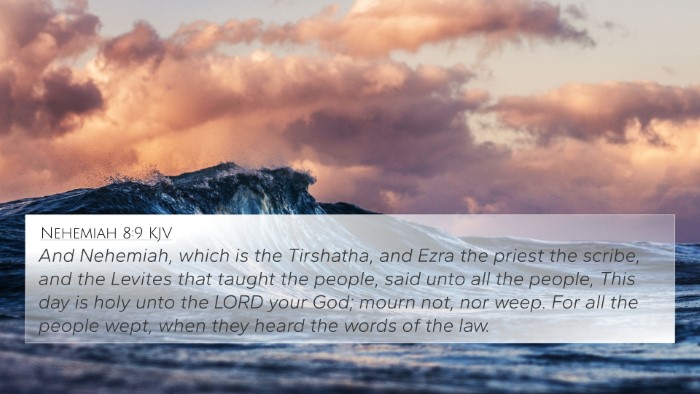
Nehemiah 8:9 (KJV) »
And Nehemiah, which is the Tirshatha, and Ezra the priest the scribe, and the Levites that taught the people, said unto all the people, This day is holy unto the LORD your God; mourn not, nor weep. For all the people wept, when they heard the words of the law.
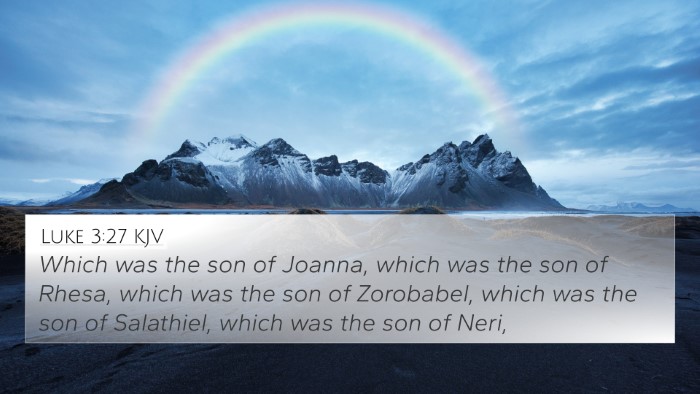
Luke 3:27 (KJV) »
Which was the son of Joanna, which was the son of Rhesa, which was the son of Zorobabel, which was the son of Salathiel, which was the son of Neri,
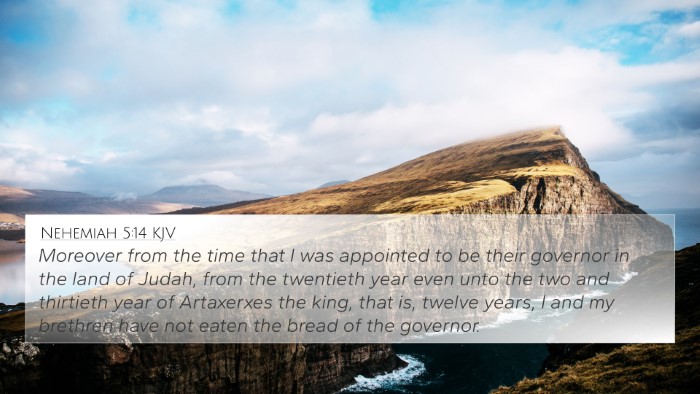
Nehemiah 5:14 (KJV) »
Moreover from the time that I was appointed to be their governor in the land of Judah, from the twentieth year even unto the two and thirtieth year of Artaxerxes the king, that is, twelve years, I and my brethren have not eaten the bread of the governor.
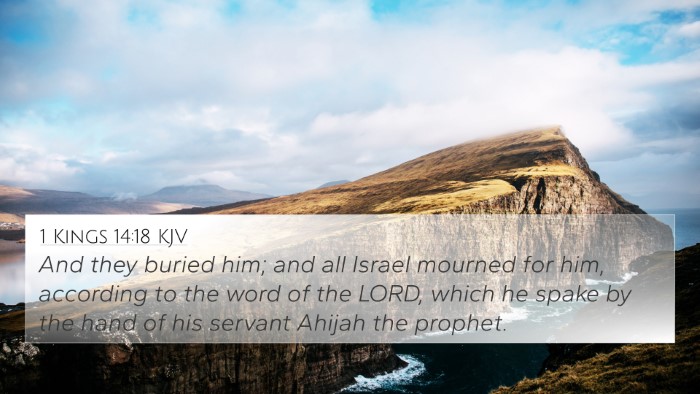
1 Kings 14:18 (KJV) »
And they buried him; and all Israel mourned for him, according to the word of the LORD, which he spake by the hand of his servant Ahijah the prophet.
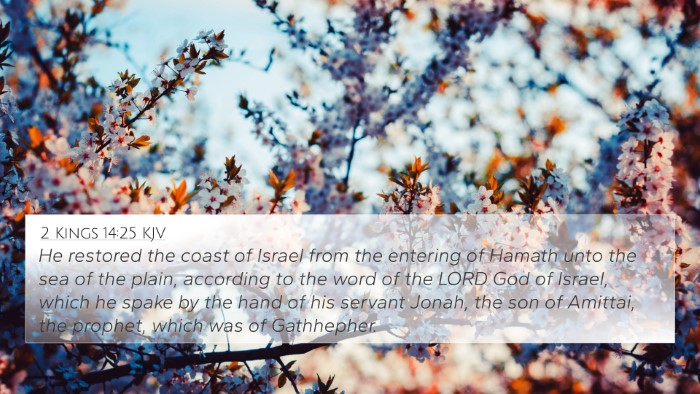
2 Kings 14:25 (KJV) »
He restored the coast of Israel from the entering of Hamath unto the sea of the plain, according to the word of the LORD God of Israel, which he spake by the hand of his servant Jonah, the son of Amittai, the prophet, which was of Gathhepher.
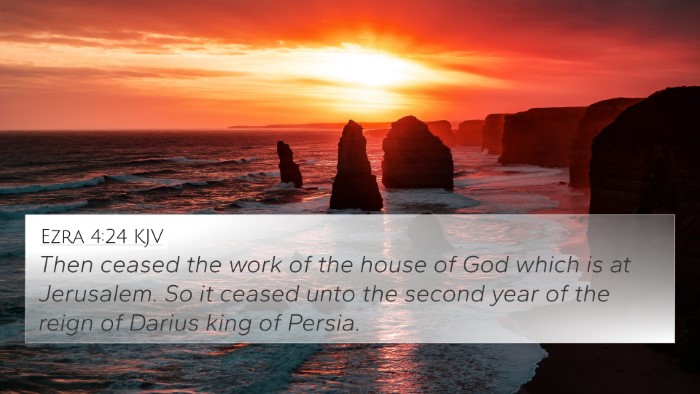
Ezra 4:24 (KJV) »
Then ceased the work of the house of God which is at Jerusalem. So it ceased unto the second year of the reign of Darius king of Persia.
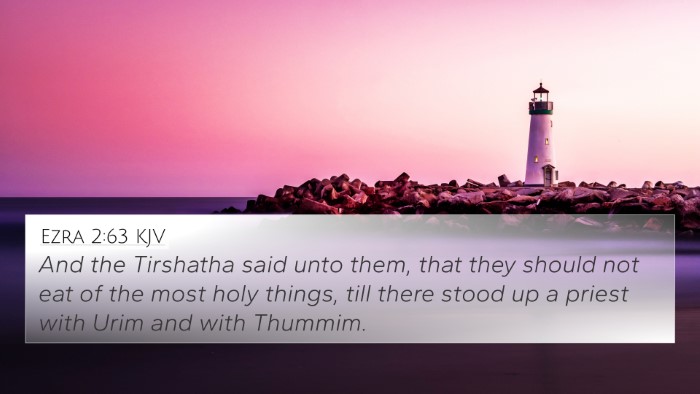
Ezra 2:63 (KJV) »
And the Tirshatha said unto them, that they should not eat of the most holy things, till there stood up a priest with Urim and with Thummim.
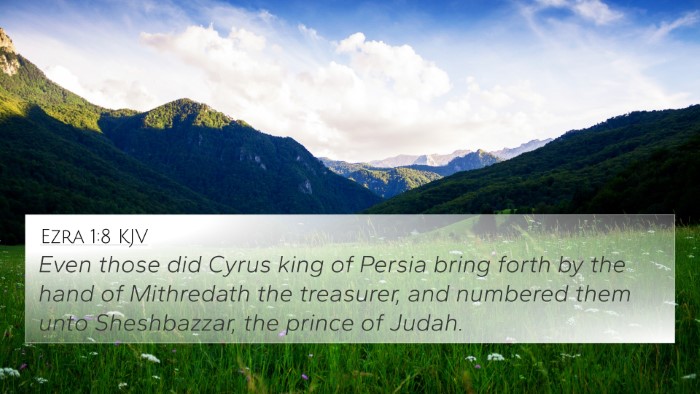
Ezra 1:8 (KJV) »
Even those did Cyrus king of Persia bring forth by the hand of Mithredath the treasurer, and numbered them unto Sheshbazzar, the prince of Judah.
Haggai 1:1 Verse Analysis and Similar Verses
Understanding Haggai 1:1
“In the second year of Darius the king, in the sixth month, in the first day of the month, came the word of the Lord by Haggai the prophet unto Zerubbabel the son of Shealtiel, governor of Judah, and to Joshua the son of Josedech, the high priest, saying,” (Haggai 1:1, KJV)
Summary of Haggai 1:1
This verse marks the onset of the prophetic ministry of Haggai during a specific historical context—the reign of Darius the king of Persia. Haggai's message is directed towards significant leaders of Judah: Zerubbabel, the governor, and Joshua, the high priest. This establishes not only the authority of the message but also its immediacy in addressing the people of Israel in their post-exilic period.
Historical Context
The historical backdrop of Haggai is crucial for understanding the significance of the exhortation delivered by the prophet. The events occur after the Jewish exiles return to Jerusalem and begin to rebuild the temple. However, their efforts have stalled due to opposition and neglect, prompting Haggai’s messages, which aim to encourage and prompt a decisive course for the people.
Analysis of Key Themes
- Divine Timing: The mention of the specific time—second year of Darius, sixth month—highlights God’s perfect timing and preparedness to deliver His message. Commentators note that God acts in history and through specific events.
- Authority of Prophecy: The introduction of Haggai as a prophet signifies that the word came directly from the Lord, establishing the seriousness of the command to rebuild the temple. This is reinforced by references to other prophets like Zechariah who also encourage restoration.
- Leadership Roles: Haggai addresses the civil and spiritual leaders; this emphasizes the weightiness of his message, which carries implications for both governance and religious duties.
- Call to Action: The urgency of the prophetic message can be seen as a catalyst for mobilizing the people to reassess their priorities and rebuild their worship life centered around the temple.
Biblical Cross-References
Understanding Haggai 1:1 becomes more profound when we consider its connections to other scriptures:
- Ezra 5:1-2: The prophetic encouragement of rebuilding the temple is echoed in Ezra’s narrative.
- Jeremiah 29:10-14: God’s promise to restore His people after exile resonates with the themes in Haggai.
- Zechariah 1:1-6: Another prophet addressing the restoration that complements Haggai's call for action.
- Malachi 1:14: The prophetic call to reverence in worship connects to the rebuilding of the temple.
- Isaiah 44:24-28: God's sovereignty and promise of restoration through leaders like Cyrus reflect the broader narrative of exile and return.
- Nehemiah 2:18: The resolve to rebuild the city contrasts with the responsibilities presented by Haggai.
- Matthew 21:12: Jesus’ cleansing of the temple highlights the ongoing significance of the temple in worship.
- 1 Corinthians 3:16-17: The New Testament parallels between the physical and spiritual temples is evident.
- Revelation 21:22: The ultimate fulfillment of God’s dwelling with His people echoes throughout scripture, returning to the importance of the temple.
- Luke 19:44: The foretelling of Jerusalem's fate relates to the necessity of a restored worship that Haggai calls for.
Thematic Connections
By examining the connections between these verses, we can glean deeper insights into the purpose of Haggai's message:
- Restoration: Haggai’s call parallels the broader theme of restoration present throughout the Old Testament.
- Divine Presence: The rebuilding of the temple signals not just a physical structure, but the desire for God’s presence amongst His people.
- Spiritual Renewal: The emphasis on prioritizing God’s house in Haggai initiates a dialogue on spiritual renewal, echoed in the New Testament understanding of the church.
Conclusion
Haggai 1:1 serves as an essential starting point for understanding the prophetic call to rebuild the temple, emphasizing themes of divine timing, leadership, and urgent action. It establishes critical linkages with other scriptures, offering a framework for not just historical analysis but also applying its timeless principles in contemporary faith practice.
